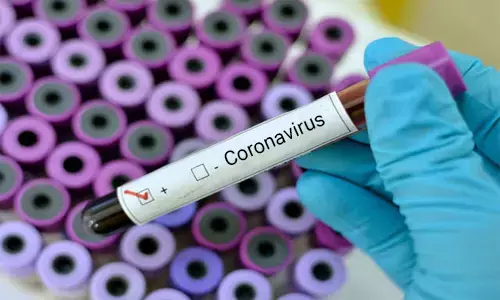- Home
- Medical news & Guidelines
- Anesthesiology
- Cardiology and CTVS
- Critical Care
- Dentistry
- Dermatology
- Diabetes and Endocrinology
- ENT
- Gastroenterology
- Medicine
- Nephrology
- Neurology
- Obstretics-Gynaecology
- Oncology
- Ophthalmology
- Orthopaedics
- Pediatrics-Neonatology
- Psychiatry
- Pulmonology
- Radiology
- Surgery
- Urology
- Laboratory Medicine
- Diet
- Nursing
- Paramedical
- Physiotherapy
- Health news
- Fact Check
- Bone Health Fact Check
- Brain Health Fact Check
- Cancer Related Fact Check
- Child Care Fact Check
- Dental and oral health fact check
- Diabetes and metabolic health fact check
- Diet and Nutrition Fact Check
- Eye and ENT Care Fact Check
- Fitness fact check
- Gut health fact check
- Heart health fact check
- Kidney health fact check
- Medical education fact check
- Men's health fact check
- Respiratory fact check
- Skin and hair care fact check
- Vaccine and Immunization fact check
- Women's health fact check
- AYUSH
- State News
- Andaman and Nicobar Islands
- Andhra Pradesh
- Arunachal Pradesh
- Assam
- Bihar
- Chandigarh
- Chattisgarh
- Dadra and Nagar Haveli
- Daman and Diu
- Delhi
- Goa
- Gujarat
- Haryana
- Himachal Pradesh
- Jammu & Kashmir
- Jharkhand
- Karnataka
- Kerala
- Ladakh
- Lakshadweep
- Madhya Pradesh
- Maharashtra
- Manipur
- Meghalaya
- Mizoram
- Nagaland
- Odisha
- Puducherry
- Punjab
- Rajasthan
- Sikkim
- Tamil Nadu
- Telangana
- Tripura
- Uttar Pradesh
- Uttrakhand
- West Bengal
- Medical Education
- Industry
New technology can detect COVID-19 antibody in 20 minutes

Researchers have developed a technique to detect anti-virus antibody using a portable analyzer to conduct rapid on-site bio tests.The technology can be used to detect antibodies against virus of COVID-19, if a suitable reagent is developed.
Researchers have succeeded in detecting anti-avian influenza virus antibody in blood serum within 20 minutes, using a portable analyzer they have developed to conduct rapid on-site bio tests. If a suitable reagent is developed, this technology could be used to detect antibodies against SARS-CoV-2, the causative virus of COVID-19.
Avian influenza is a poultry disease caused by influenza A virus infection. Rapid initial response for a suspected infection and continuous surveillance are essential to mitigate the damage from highly pathogenic, transmittable pathogens such as avian influenza viruses.
Generally, the polymerase chain reaction (PCR) method is used to detect the viral genome, but its complicated procedure requires a considerable amount of time. Another method involves detecting antibodies produced in the body in reaction to virus infection. However, widely used antibody detection methods can be inaccurate because the antibodies' existence is generally determined by eyesight.
The group, including Keine Nishiyama, a doctoral student at Hokkaido University's Graduate School of Chemical Science and Engineering, and Professor Manabu Tokeshi of the university's Faculty of Engineering, conducted this study to develop a new method and analyzer capable of rapid, facile and selective detection of antibodies. The method is based on conventional fluorescence polarization immunoassay (FPIA) but applies a different measurement mechanism to make the analyzer much smaller and portable. The analyzer weighs only 5.5 kilograms.
The combined use of liquid crystal molecules, an image sensor and the microfluidic device makes it possible to simultaneously examine multiple samples and reduces the volume of each sample required. Liquid crystal molecules are capable of controlling the polarization direction of fluorescent light, while the microfluidic device has a number of microchannels as a measurement vessel.
The group also developed a reagent to detect anti-H5 avian influenza virus antibody, a fluorescein-labeled protein that binds only with the antibody. The reagent was made by reproducing hemagglutinin (HA) protein fragments, which are expressed on the surface of H5 avian influenza virus, through gene recombination and by labeling fluorescent molecules to the fragments.
To make the measurement, serum collected from birds was mixed with the reagent and left for 15 minutes. The mixture was injected into the microfluidic device and measured with the portable fluorescence polarization analyzer. Molecular movements of the reagent bound with the antibody will be smaller in the liquid, producing a different degree of polarization from the reagent not bound with the antibody. The system can detect anti-H5 avian influenza virus antibody with only 2 microliters of serum sample and within 20 minutes.
"Our analyzer could be used to conduct other bio tests if suitable reagents are developed," says Tokeshi. The group has already successfully detected mycotoxin and drug constituents. "By reproducing fragments of spike proteins expressed in the novel coronavirus, and using them as the reagent, the analyzer should be able to detect anti-coronavirus antibodies."
For more details click no the link: http://dx.doi.org/10.1016/j.snb.2020.128160
Hina Zahid Joined Medical Dialogue in 2017 with a passion to work as a Reporter. She coordinates with various national and international journals and association and covers all the stories related to Medical guidelines, Medical Journals, rare medical surgeries as well as all the updates in the medical field. Email: editorial@medicaldialogues.in. Contact no. 011-43720751
Dr Kamal Kant Kohli-MBBS, DTCD- a chest specialist with more than 30 years of practice and a flair for writing clinical articles, Dr Kamal Kant Kohli joined Medical Dialogues as a Chief Editor of Medical News. Besides writing articles, as an editor, he proofreads and verifies all the medical content published on Medical Dialogues including those coming from journals, studies,medical conferences,guidelines etc. Email: drkohli@medicaldialogues.in. Contact no. 011-43720751


